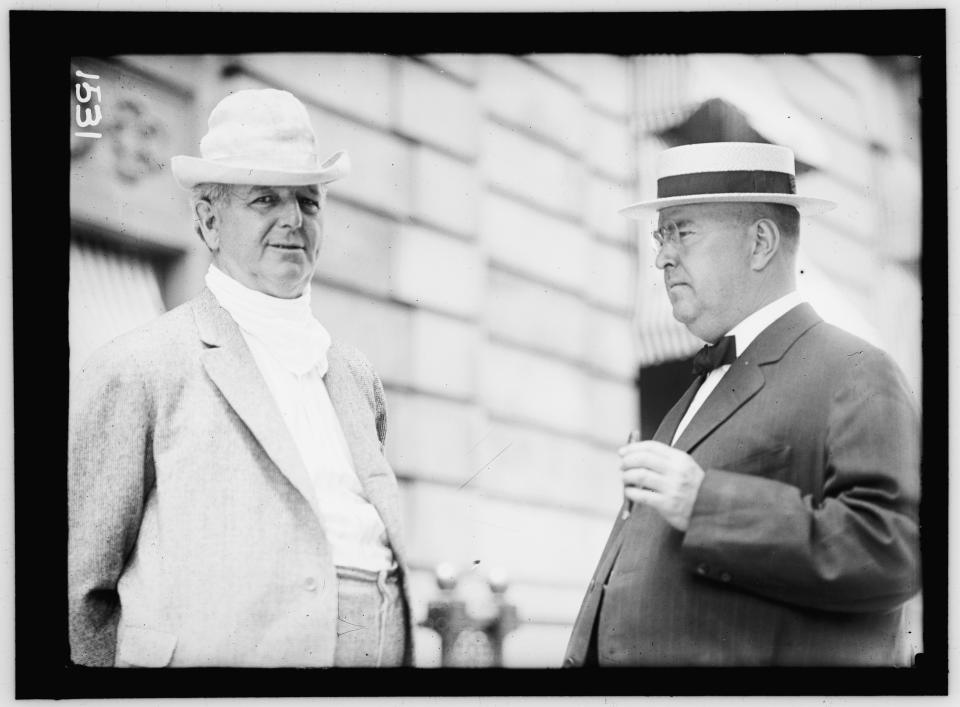'Black Sox' scandal revisited: Theatrical production, panel give reassessment

- Oops!Something went wrong.Please try again later.
- Oops!Something went wrong.Please try again later.
The Chicago "Black Sox" scandal permeated popular culture with the film "Eight Men Out."
Now one of the notorious marks on major league baseball, the 1919 World Series between the White Sox and the Cincinnati Reds, gets an examination by the Illinois Supreme Court Historic Preservation Commission's "History on Trial" series.
A theatrical production will precede a panel discussion of legal and sports experts at the Abraham Lincoln Presidential Library and Museum, 212 N. Sixth St., at 7 p.m. Oct. 25.
More:Few toxins found at Pillsbury Mills 'manageable;' group presses forward to fund demolition
The "History on Trial" series has focused in the past on Mary Todd Lincoln’s insanity hearing, Mormon prophet Joseph Smith’s habeas corpus trials and the trial of Lincoln assassination co-conspirator Mary Surratt.

Some White Sox players were allegedly in on "throwing" the 1919 World Series. In 1921, all of the players implicated in the scandal, including "Shoeless" Joe Jackson, were acquitted or not tried, but baseball commissioner Judge Kenesaw Mountain Landis permanently banned them from organized baseball.
John Lupton, the Illinois Supreme Court Historic Preservation Commission's executive director, said there's been a reassessment in the last dozen years or so about the Black Sox scandal, which will be explored in the dramatic presentation by actors from the DePaul University Theatre School as well as two authors on the topic of the scandal.
"What we've tried to do with all of our 'History on Trial' events is to look at a modern public policy issue through the lens of a historical trial and the Black Sox scandal affords us (that)," said Lupton, noting the recent centennial anniversary of the scandal and its fallout.
"There's sports gambling, which is now legal," Lupton added. "Can you imagine that in 1919? Would this have even been a scandal, for example?"
Illinois Supreme Court Chief Justice Anne M. Burke said the "History on Trial" series shows that the law is "a living, breathing element of society. The Chicago Black Sox scandal happened over 100 years ago but still looms largetoday. These presentations help root out fact from fiction in a fun and engaging way.”
Panelists Jacob Pomrenke and William F. Lamb have written extensively about the Black Sox scandal.
Pomrenke is the editor of "Scandal on the South Side" and contributed to "Eight Myths Out," the Society for American Baseball Research's Black Sox Scandal Research Committee’s online project debunking some of the most common misconceptions about the 1919 World Series fix.
Pomrenke has referred to the scandal as "a cold case, not a closed case."
Lamb, a former prosecuting attorney, is author of "Black Sox in the Courtroom: The Grand Jury, Criminal Trial and Civil Litigation."

Also on the panel are Neil H. Cohen, an at-large Cook County Circuit Judge; Raymond Doswell, vice president of curatorial services at the Negro Leagues Baseball Museum in Kansas City; Mary Robinson, the former administrator of the Illinois Attorney Registration and Disciplinary Commission (ARDC) and partner with Robinson Stewart Montgomery Doppke Law, LLC, and Scott J. Szala, a former partner at Winston & Strawn, LLP.
Tickets are $15 and are available at the Illinois Supreme Court Historic Preservation Commission website.
A second production will take place at the Spertus Institute, 610 S. Michigan Ave., Chicago, on Nov. 2.
Jason Benetti, the voice of the Chicago White Sox, will speak @ALPLM at 7 p.m. Tuesday to share his stories of baseball and life with cerebral palsy. pic.twitter.com/avzE1LcgK4
— Steven Spearie (@StevenSpearie) October 17, 2022
Contact Steven Spearie: 217-622-1788, sspearie@sj-r.com, twitter.com/@StevenSpearie.
This article originally appeared on State Journal-Register: A theatrical production and panel reexamine 1919 Black Sox scandal

